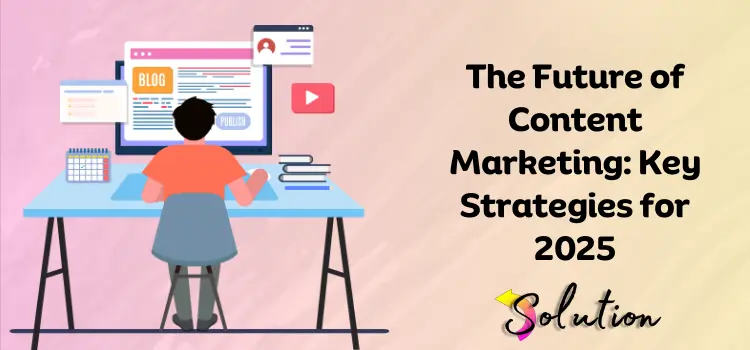
In the ever-evolving world of digital marketing, content marketing creates valuable and relevant content to attract, engage, and retain the target audience. As we are welcoming 2025 with warm hugs, more brands are now opting for content marketing strategies to promote their products and services.
This increases the competition and encourages brands to develop different and unique trends and strategies. So, what does the future hold for content marketing?
As a marketer, you can’t expect 2025 to be the normal next year. As consumer expectations soar, brands will need to focus on creating personalized and interactive content to stand out in the crowded digital landscape.
So, content marketing is set to become more intelligent, interactive, creative, and impactful. By the end of 2025, we will see unexpected advancements in content marketing strategies.
In this blog, we will delve into the transformative changes and shifts in content marketing that you should equip yourself with to grow your brand in 2025. Knowing and updating yourself with these trends may help you stay ahead of the competition and connect with your target audience in a more meaningful way.
Why Content Marketing is Important in 2025?
“Consumers want to fall in love with the brand, but most of the brands fail to welcome their consumers with warm hugs.” – Mr. Gaurav Sharma, Content Marketer
The reason is your brand misses attractiveness, attitude, and achievements. Are you curious about how this can be achieved?
The answer is: content marketing.
With content marketing, brands can easily establish a connection with their target audience, convey their message, and build trust and credibility.
It’s also among the effective ways to adapt to ever-changing consumer behaviors and preferences in the digital landscape.
Furthermore, ranking content higher on search engines is not only possible due to the power of SEO techniques. There is a major role for content marketing, which helps brands to increase their online visibility and reach a wider audience.
When carried out effectively, it can be one of the most powerful tools in a brand’s marketing strategy, driving traffic, engagement, and ultimately conversions.
2025’s Content Compass: Dominating Strategies to Adopt Immediately
One thing that is constant in content marketing is change. Strategies in content marketing keep changing from time to time as per the consumer’s behavior. Adapting to these changes allows the brands to showcase their expertise and authority in their industry, positioning themselves as industry experts in the eyes of consumers.
1. AI-Driven Personalization
Thanks to AI’s ability to provide highly customized experiences, content marketing is about to undergo a radical transformation. Using real-time data analysis of user behavior, tastes, and demographics, AI systems will begin to create audience-specific content in 2025.
Envision a shopping website that uses personalized product suggestions or email marketing that seems personal. At this level of personalization, engagement and loyalty are both enhanced. By meeting consumers where and when they are most engaged, AI-powered brands save time and strengthen relationships.
2. Interactive Content Experiences
Quizzes, surveys, clickable infographics, and augmented reality (AR) experiences are quickly replacing static material. Interactive content enhances user engagement by enabling them to actively participate in the brand’s journey.
Examples of features that generate unforgettable experiences include augmented reality tools that let users virtually place furnishings in their own houses and product recommendation quizzes that take into account individual tastes. An important trend in 2025, this kind of material increases dwell time and encourages sharing.
3. Voice Search Optimization
Search engine optimization for voice search is going to be a must-have as smart speakers and voice assistants become commonplace in homes. Conversational language and short, to-the-point responses should be the brands’ priority.
Brands may increase their visibility in voice search results, particularly in the highly sought-after featured snippets, by creating content that conforms to natural speech patterns and answers frequently requested topics.
4. Immersive Storytelling With AR/VR
The use of AR and VR in content marketing is transforming the storytelling process. Immersive experiences allow brands to engage with audiences in a distinct manner. Imagine a travel agency providing virtual reality (VR) tours of popular locations or a car manufacturer allowing customers to “test drive” virtual versions of their products.
Both the content and the user develop an emotional connection as a result of these immersive narratives.
5. User-Generated Content (UGC) Amplification
The credibility of user-generated content as a marketing tool is only going up. Genuine client reviews, social media posts, and testimonials bolster a brand’s credibility.
Promoting products in use or holding photo challenges are two examples of user-generated content campaigns that encourage customers to share their tales and, in turn, increase engagement. These endeavors transform audiences into champions, fostering a positive cycle of trust and influence.
5. Micro-Moment Marketing
Modern consumers are impatient for immediate satisfaction, and “micro-moments” are crucial for brands to create an impression that lasts. In these “micro-moments,” people seek out their phones or tablets for immediate information. Brands that are able to provide short, mobile-friendly content during these periods will have a leg up on the competition.
Envision a fitness company that provides concise, practical exercise guides to people who look for “quick exercises.” As an example, a skincare company could provide short frequently asked questions (FAQs) to answer current inquiries regarding the advantages of their products. Not only do these strategic touchpoints captivate users, but they also lead them effortlessly to conversion.
Brands should focus on being quick, relevant, and simple to use if they want to be successful in micro-moment marketing. Content should be mobile-friendly, using simple, direct language that addresses users’ urgent concerns.
Companies may build trust and loyalty with customers over time by taking advantage of micro-moments, which are short but impactful interactions.
Read Also:- Guide to Creating a Winning B2B Content Marketing Strategy
Ending Tip: Ruling Content Marketing Strategy in 2025
2025 will see a revolution in the way brands interact with their audiences through content marketing. Innovations like micro-moment marketing, sustainability-driven messaging, and AI-powered personalization are crucial for staying competitive in the ever-changing digital landscape. Brands can connect with their target consumers on a deeper level by making use of these innovations to make experiences that are relevant, engaging, and meaningful.
Brands that use these tactics will see an increase in consumer loyalty and revenue as a result of the better relationships they foster. Maintaining a level of flexibility, creativity, and alignment with changing consumer tastes is crucial for achieving success. In 2025, marketers will face the difficulty and opportunity of staying ahead of these shifts and creating purpose-driven content strategies that make an impression.


